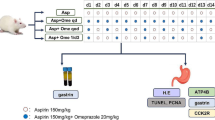Abstract
The effects of nonsteroidal antiinflammatory drugs on ulcerogenesis and gastric secretion were evaluated in a pylorus-ligated rat model. Oral administration of salicylate (50 mg/kg), aspirin (50 mg/kg), and indomethacin (3.5 mg/kg) significantly increased ulcerogenesis over the basal value by six- to sevenfold, but ibuprofen's (10 mg/kg) fourfold increase was not significant. Aspirin in conjunction with histamine (0.5 mg/kg subcutaneously) significantly increased ulcerogenesis by 2.7-fold compared to histamine alone. Basal acid secretion was increased significantly by 156% after indomethacin, but not by other nonsteroidal antiinflammatory drugs. In contrast, all nonsteroidal antiinflammatory drugs, except indomethacin, significantly decreased histamine-stimulated acid secretion. Nonsteroidal antiinflammatory drugs had no effect on pepsinogen secretion. Ranitidine pretreatment (25 mg/kg intraperitoneally) significantly decreased basal acid and pepsinogen secretion in all treatment groups by >85% and >40%, respectively, and ulcerations induced by salicylate, aspirin, and indomethacin were also inhibited by 90%, 60%, and 60%, respectively. The observed inhibition of prostaglandin E2 generation by nonsteroidal antiinflammatory drugs under basal secretory conditions appeared to correlate with the extent of ulcerogenesis. Our data support the concept that acid, in addition to inhibition of prostaglandin E2 synthesis, plays an important role in the pathogenesis of nonsteroidal antiinflammatory drug-induced gastropathy.
Similar content being viewed by others
References
Levine RA, Schwartzel EH: Effect of indomethacin on basal and histamine stimulated human gastric acid secretion. Gut25:718–722, 1984
Feldman M, Colturi TJ: Effect of indomethacin on gastric acid and bicarbonate secretion in humans. Gastroenterology 87:1339–1343, 1984
Levine RA, Nandi J, King RL: Aspirin potentiates prestimulated acid secretion and mobilizes intracellular calcium in rabbit parietal cells. J Clin Invest 86:400–408, 1990
Levine RA, Nandi J, King RL: Nonsalicylate NSAIDs augment prestimulated acid secretion in rabbit parietal cells. Gastroenterology 101:756–765, 1991
Nandi J, Crockett J, Levine RA: Ibuprofen and aspirin augment prestimulated H+ secretion in chambered frog gastric mucosa: Role of protein kinase C and prostaglandins. Clin Res 39:168A, 1991 (abstract)
Nandi J, Crockett J, Levine RA: Aspirin and ibuprofen stimulate pepsinogen secretion in frog gastric mucosa. Gastroenterology 100:A131, 1991 (abstract)
Lanas A, Nevin J, Esteva F, Sainz R: Nonsteroidal antiinflammatory drugs (NSAIDs) effects on pepsinogen secretion by dispersed human peptic cells. Gastroenterology 104:A129, 1993 (abstract)
Daugherty DF, Lucy MR, Yamada T: Gastric secretion.In Textbook of Gastroenterology. T Yamada, DH Alpers, C Owyang, DH Powell, FE Silverstein (eds). Philadelphia, JB Lippincott Company, 1991, pp 233–264
Shay H, Sun DC, Gruenstein M: A quantitative method for measuring spontaneous gastric secretion in the rat. Gastroenterology 26:905–913, 1954.
Soldani G, Del Tacca M, Bertelli A: The effect of H1 and H2-receptor antagonists on gastric ulcerations and acid secretion induced by polymixin B. Drugs Exp Clin Res 8:201–204, 1982
Anson ML, Mirsky PV: Estimation of pepsin with hemoglobin. J Gen Physiol 16:59–63, 1932
Wallace JL, Cohen MM: Gastric mucosal protection with chronic mild restraint: Role of endogenous prostaglandins. Am J Physiol 247:G127-G132, 1984
Levine RA, Petokas S, Nandi J, Enthoven D: Effects of nonsteroidal, antiinflammatory drugs on gastrointestinal injury and prostanoid generation in healthy volunteers. Dig Dis Sci 33:660–666, 1988
Okada M, Niida H, Takeuchi K, Okabe S: Role of prostaglandin deficiency in pathogenetic mechanism of gastric lesions induced by indomethacin in rats. Dig Dis Sci 34:694–702, 1989
Bulbena O, Esplugues J, Escolar G, Gil L, Navarro C, Esplugues J: Zinc acexamate inhibits gastric acid and pepsinogen secretion in the rat. J Pharm Pharmacol 42:252–256, 1990
Kleveland PM, Waldum HL, Peterson H, Sandberg P: Pepsin secretion by the totally isolated, vascularly perfused rat stomach. Scand J Gastroenterol 22:165–173, 1987
Segawa Y, Takei M, Omata T, Tsuzuike N, Yamaji Y, Kurimoto T, Ozeki M, Tagashira E: Effects of the new anti-ulcer drug Nizatidine on prostaglandins in the rat gastric mucosa. Drug Res 411:950–953, 1991
Hersey SJ, Miller M, May D, Norris SH: Lack of interaction between acid and pepsinogen secretion in isolated gastric glands. Am J Physiol 245:G775-G779, 1983
Tani S, Tanaka T: Direct inhibition of pepsinogen secretion from rat gastric chief cells by somatostatin. Chem Pharm Bull 38:2246–2248, 1989
Tani S, Tanaka T, Kudo Y, Takahagi M: Pepsinogen secretion from cultured rat gastric mucosal cells. Chem Pharm Bull 37:2188–2190, 1989
Bhattacharjee M, Chakraborty T, Banerjee K: Dissociation of gastric acid and pepsinogen secretion in response to mercaptomethylimidazol—a new secretory compound. Biochem Pharmacol 40:1095–1101, 1990
Shea-Donohue T, Steel L, Montcalm-Mazzilli E, Dubois A: Aspirin-induced changes in gastric function: Role of endogenous prostaglandins and mucosal damage. Gastroenterology 98:284–292, 1990
Wang J, Nagai H, Okabe S: Effect on delayed healing of acetic acid-induced gastric ulcers in rats. Jpn J Pharmacol 54:82–85, 1990
Flower RJ: Drugs which inhibit prostaglandin biosynthesis. Pharmacol Rev 26:33–67, 1974
Author information
Authors and Affiliations
Additional information
Parts of this study have been published in abstract form (Gastroenterology 102:A186, 1992).
The work related to ranitidine effects was funded in part by a grant from Glaxo, Inc.
Rights and permissions
About this article
Cite this article
Wagner, K.A., Nandi, J., King, R.L. et al. Effects of nonsteroidal antiinflammatory drugs on ulcerogenesis and gastric secretion in pylorus-ligated rat. Digest Dis Sci 40, 134–140 (1995). https://doi.org/10.1007/BF02063956
Received:
Revised:
Accepted:
Issue Date:
DOI: https://doi.org/10.1007/BF02063956




